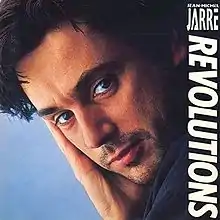Revolutions (Jean-Michel Jarre album)
Revolutions is the ninth studio album by electronic musician and composer Jean-Michel Jarre, first released in August 1988. The album spans several genres, including symphonic industrial, Arabian inspired, light guitar pop and ethnic electro jazz. The album reached number #2 in the UK charts, Jarre's best chart position since Oxygène. The Destination Docklands concert in London coincided with the release of the album.
| Revolutions | ||||
|---|---|---|---|---|
 | ||||
| Studio album by | ||||
| Released | August 1988 | |||
| Recorded | 1987-1988 at Croissy Studio, France | |||
| Genre | Electronica, world music, synthpop, electro, dance-rock | |||
| Length | 44:21 | |||
| Label | Disques Dreyfus | |||
| Producer | Jean-Michel Jarre | |||
| Jean-Michel Jarre chronology | ||||
| ||||
| Singles from Revolutions | ||||
| ||||
| Review scores | |
|---|---|
| Source | Rating |
| Allmusic | |
Composition and recording
There are two versions of the album, each containing a different version of the track "Revolutions". On the original release, the introduction to the tune is played on a Turkish flute, whereas the later reissue of the album uses an Arabian string orchestra for the introduction. This version also has a different vocal accompaniment, as sung by an Arabian vocalist. "Revolutions" contains reworked samples of an unpublished composition by Turk Kudsi Erguner, which Jarre had acquired from ethnologist Xavier Bellenger. Erguner took his case to court and won a modest indemnity.[2] Jarre removed the flute part—the Ney—from new releases of the record and from live performances.
The song "London Kid" was a collaboration with Hank Marvin. Hank was living in Perth, Australia at the time and he and Jean-Michel composed the song with each other over the phone.
As stated in the liner notes, the track "September" is named after and dedicated to South African ANC activist Dulcie September, who was assassinated in Paris on 29 March 1988.[3]
The majority of the album was played with a Roland D-50 synthesizer, with the majority of sound programming gathered from custom sound banks, compiled into a single bank and later released for French Keyboards magazine.
Track listing
1988 Original Release
| No. | Title | Length |
|---|---|---|
| 1. | "Révolution industrielle" (Industrial Revolution)
| 16:51 |
| 2. | "London Kid" | 4:27 |
| No. | Title | Length |
|---|---|---|
| 1. | "Révolutions" (Revolutions) | 4:57 |
| 2. | "Tokyo Kid" | 5:21 |
| 3. | "Computer Weekend (recorded and released in 1987)" | 4:42 |
| 4. | "September" | 3:53 |
| 5. | "L'Emigrant" (The Emigrant) | 4:10 |
| Total length: | 44:21 | |
1988 Another Release
| No. | Title | Length |
|---|---|---|
| 1. | "Industrial Revolution Overture" | 5:11 |
| 2. | "Industrial Revolution Part 1" | 5:10 |
| 3. | "Industrial Revolution Part 2" | 2:17 |
| 4. | "Industrial Revolution Part 3" | 4:13 |
| 5. | "London Kid" | 4:27 |
| 6. | "Revolutions" | 4:57 |
| 7. | "Tokyo Kid" | 5:21 |
| 8. | "Computer Weekend" | 4:42 |
| 9. | "September" | 3:53 |
| 10. | "L'Emigrant" (The Emigrant) | 4:10 |
| Total length: | 44:21 | |
1991 Release (remaster)
| No. | Title | Length |
|---|---|---|
| 1. | "Industrial Revolution Overture" | 5:11 |
| 2. | "Industrial Revolution Part 1" | 5:10 |
| 3. | "Industrial Revolution Part 2" | 2:17 |
| 4. | "Industrial Revolution Part 3" | 4:13 |
| 5. | "London Kid" | 4:27 |
| 6. | "Revolution, Revolutions" | 4:55 |
| 7. | "Tokyo Kid" | 5:21 |
| 8. | "Computer Weekend" | 4:42 |
| 9. | "September" | 3:53 |
| 10. | "L'Emigrant" (The Emigrant) | 4:10 |
| Total length: | 44:19 | |
Personnel
- Jean-Michel Jarre – Roland D-50, Korg DSS-1, Korg DSM-1, Fairlight CMI, Synthex, EMS Synthi AKS, OSC OSCar, EMS Vocoder, Dynacord Add-one, Cristal Baschet, Akai MPC60, drum programming, percussions, Vocoder on "Revolutions"
- Guy Delacroix – Bass guitar
- Sylvain Durand – Fairlight CMI on "London Kid"
- Kudsi Erguner – Turkish flute
- Michel Geiss – ARP 2600, Kawai K5, Matrisequencer, Cavagnolo MIDY 20, Elka AMK 800, vocoder on "Revolutions"
- Joe Hammer – Drums, Simmons, SDX, Dynacord Add-one
- Patrice Tison – Guitar
- Hank Marvin – Guitar on "London Kid"
- Jun Miyake – Trumpet and Megaphone on "Tokyo Kid"
- Dominique Perrier – E-mu Emulator, Fairlight CMI, Ensoniq ESQ-1, Roland D-50, Elka Synthex, OSC Oscar, Akai MPC 60 programming
- Mireille Pombo – Vocal chorus on "September"
- Francis Rimbert – Additional synthesizer programming
- The Bruno Rossignol Choir, directed by Bruno Rossignol – choir on "Industrial Revolution", "London Kid" and "The Emigrant"
- Female choir from Mali, directed by Sori Bamba – choir on "September"
Certifications
| Region | Certification | Certified units/sales |
|---|---|---|
| France (SNEP)[4] | 289,200 [5]* | |
| United Kingdom (BPI)[6] | Gold | 100,000^ |
|
* Sales figures based on certification alone. | ||
References
- Notes
- https://www.allmusic.com/album/r107185
- Aubert, Seeger & Ribeiro 2007, p. 61
- Jarre, Jean-Michel (1988). Revolutions (liner notes). Disques Dreyfus.
- "French album certifications – JMJ – Revolutions" (in French). Syndicat National de l'Édition Phonographique.
- http://www.infodisc.fr/Ventes_Albums_Tout_Temps.php?debut=1315
- "British album certifications – JMJ – Revolutions". British Phonographic Industry. Select albums in the Format field. Select Gold in the Certification field. Type Revolutions in the "Search BPI Awards" field and then press Enter.
- Bibliography
- Aubert, Laurent; Seeger, Anthony; Ribeiro, Carla (2007), The music of the other: new challenges for ethnomusicology in a global age, Ashgate Publishing Ltd, ISBN 978-0-7546-5343-1
External links
- Revolutions at Discogs
- Revolutions at JarreUK